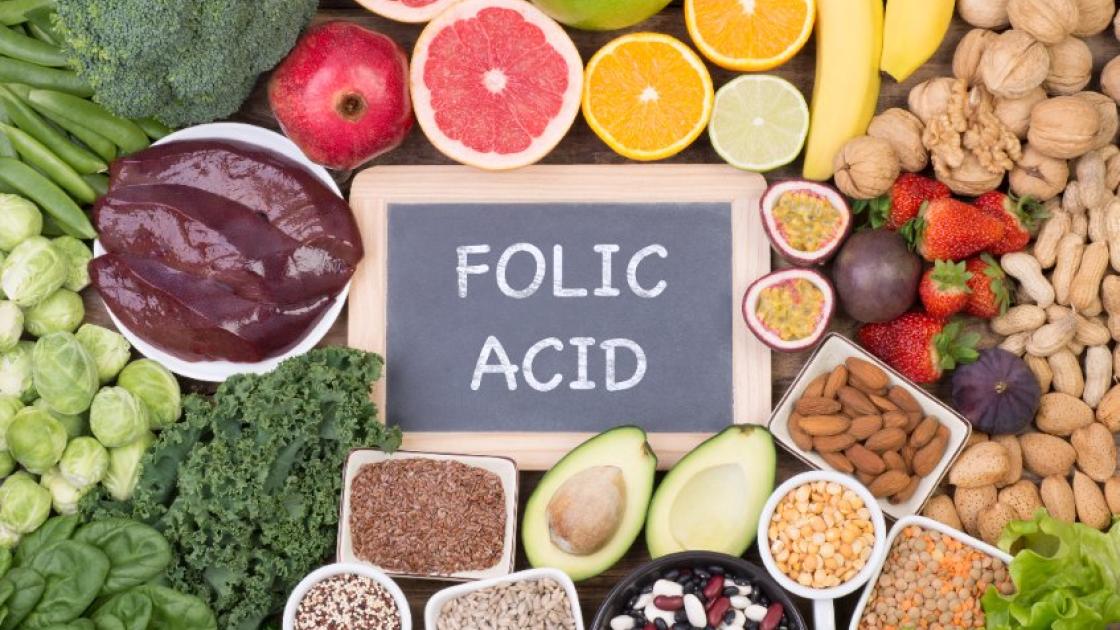
Why is folic acid important for women's health?
Folate and folic acid (vitamin B9) are necessary for optimal human health. Neither folate nor folic acid are stored within the body. Excess amounts are excreted out through urine, so we must obtain it from the foods in our diet or take supplements.
It is especially important for women to get enough folate and folic acid in their diet. Read on to learn why and to find out how you can make sure you're consuming the right amount of this important nutrient.
Folate vs. folic acid: What's the difference?
Folate is the natural form of vitamin B9 and is found in foods like leafy green vegetables. Folic acid is the synthetic or manmade version of vitamin B9 and is found in dietary supplements and certain fortified foods.
Some research suggests that the body better absorbs folic acid better than folate, but both types of vitamin B9 are important—especially for females.
What do folate and folic acid do in the body?
All bodies need folic acid and folate. These two forms of vitamin B9 support several important functions, including:
- The formation of red blood cells and other tissues
- The formation of DNA
- The creation, breakdown and use of proteins
For females, folate and folic acid are especially important because they help prevent serious birth defects in unborn babies called neural tube defects (e.g., spina bifida). Neural tube defects occur within the first few weeks of pregnancy—often before a woman even knows she is pregnant.
Folic acid is also important for females because it can help prevent early pregnancy loss (miscarriage) and folate-deficiency anemia, a condition in which a person does not have enough red blood cells to carry oxygen around the body.
How much folic acid do I need?
The amount of folic acid you need to consume every day depends on factors including your current age, your ethnicity, and whether you are or can get pregnant.
Here's what the National Institute of Health's Office of Dietary Supplements recommends for adults:
- Male adults aged 19 or older: 400 micrograms (400 mcg)
- Female teens and adults who are or could get pregnant: 400 to 800 mcg per day, including at least 600 mcg per day when pregnant and at least 500 mcg per day when nursing
At SIU Medicine, our women's health providers encourage all girls and women of childbearing age to eat folate-rich foods and take a daily supplement containing at least 400 mcg of folic acid. This is important even if you're not trying to get pregnant.
Why? Remember — folic acid helps prevent neural tube defects that develop early in pregnancy, often before a woman even realizes she's pregnant. Since more than half of all pregnancies are unplanned, regularly supplementing with folic acid can help reduce the chances of birth defects should you become unexpectedly pregnant, such as when your birth control method fails.
Is there such a thing as too much folic acid?
According to the Office on Women's Health, it is possible to consume too much folic acid from supplements or fortified foods. Excess folic acid may mask vitamin B12 deficiency, which can lead to problems like nerve damage.
For this reason, people should not consume more than 1,000 mcg per day (the upper tolerable limit) of folic acid, unless a doctor prescribes it. However, you can't get too much from eating foods that contain folate.
How women can get more folic acid in their diets
Folate, the natural form of vitamin B9, is found in a variety of foods. As a woman, incorporating these foods into your diet is a great way to protect your health and your unborn baby's health.
Some top folate-rich foods include:
- Dark, leafy green vegetables, like spinach
- Nuts
- Beans
- Poultry
- Whole grains
- Eggs
- Oranges
In addition to eating folate-rich foods, you can also eat more foods that have been fortified with folic acid, including certain breakfast cereals, pastas and white rice.
Are you a woman with questions about your health?
The women's health providers at SIU Medicine are comprehensively trained and compassionate about helping females of all ages and backgrounds thrive in their health and wellbeing. To connect with a women's health provider in Southern Illinois, find a doctor at siumed.org/doctor and schedule an appointment today.




